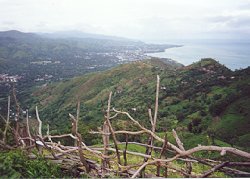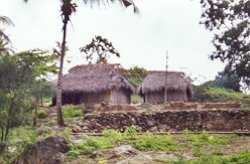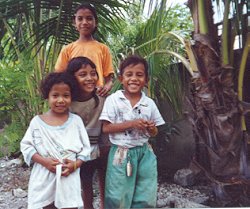

|
New Plymouth, April 2001.
SINCE I'VE BEEN BACK from East Timor, I have sent these articles to a friends who are still working there. One feels I had focused on the negative and asked me why hadn’t I written more about the work achieved, the challenges, the friendships started?
If I have only portrayed East Timor as bleak and tragic, I have misled you. My experience there was overwhelmingly positive, always interesting, usually fun and very rewarding. It is exciting being at the developing edge of a new nation.
I’ve said little about the Timorese people. They are handsome to look at and friendly to be around. Most have an underlying sadness but they have dignity and are generally fair and reasonable to deal with. They are certainly willing, capable and intelligent.
 The land itself is beautiful and full of contrasts. The beaches have golden sand and the water is very warm. I swam often but only once saw waves on the north coast. The south coast has surf but there is very little road access.
The land itself is beautiful and full of contrasts. The beaches have golden sand and the water is very warm. I swam often but only once saw waves on the north coast. The south coast has surf but there is very little road access.
The interior is not what I think of as tropical. Parts of it are sparsely dotted with wiry gum trees. Some areas look like they haven’t seen rain in years. There are 100 meter wide riverbeds that run at a trickle, if at all, unless it is raining in the mountains and then they’ll be raging. The interior of the island is mostly rugged, steep, mountains with people living on them and in the valleys. Driving to Suai, after living in the smoldering heat of Dili, it came as a surprise to me that much of East Timor is elevated and gets quite cold.
 In other places it’s a tropical paradise. In Baucau there are huge freshwater springs running right through town. It is lush and the outcrops of rock are sharp, sculptured coral limestone. Driving through these and getting glimpses of thatched houses you might wonder if you weren’t on a ride at a theme park. There are coconut palms, fan palms and banana trees. Where the hillsides are cultivated, they are covered in maize and the valleys in rice. Men fish from hollow-log outrigger canoes. There are water buffalo, short-haired sheep, ponies.
In other places it’s a tropical paradise. In Baucau there are huge freshwater springs running right through town. It is lush and the outcrops of rock are sharp, sculptured coral limestone. Driving through these and getting glimpses of thatched houses you might wonder if you weren’t on a ride at a theme park. There are coconut palms, fan palms and banana trees. Where the hillsides are cultivated, they are covered in maize and the valleys in rice. Men fish from hollow-log outrigger canoes. There are water buffalo, short-haired sheep, ponies.
Why do malaes, like me, go to East Timor? Everyone has a different reason. Many feel an obligation to help correct the terrible injustices done to the Timorese. Many are members of East Timor support groups who campaigned on its behalf for years and now want to be there at the rebuilding. But for others, it is just a career step and a good paying UN job. Some are idealists who want to work in the 3rd World and this is where they were assigned.
My experience is that people who go there to work as volunteers, do it to contribute towards making the world a better place.
What people get out of going to East Timor can be quite unexpected. I learned that it’s enlivening to go beyond where I feel secure and in control. It is provocative and can even be inspiring to be where life is uncertain, a little risky, even scary. Putting yourself “out there”, may give you a renewed respect for yourself and your own abilities. I believe that what people get out of their experience in East Timor, or anywhere else for that matter, is limited only by how much they give of themselves.
 We often hear and read about the expanding gap between the rich and the poor. We see it in NZ and you can see it on another scale in East Timor. When I read about half the people of the world not having clean water, I now know it also means they lack food. It means children are debilitated from diseases that could easily be prevented and that people are being held back from attaining their potential. These things are tragic, and unnecessary.
We often hear and read about the expanding gap between the rich and the poor. We see it in NZ and you can see it on another scale in East Timor. When I read about half the people of the world not having clean water, I now know it also means they lack food. It means children are debilitated from diseases that could easily be prevented and that people are being held back from attaining their potential. These things are tragic, and unnecessary.
I believe we underestimate our personal abilities to effect this imbalance.
Money in the right places does make a difference to poverty. It buys beans, pencils, shoes, medicines, education. Giving money is a very practical way of helping people not to have to constantly be focused on their own survival.
Giving time is another way to help shorten the rich/poor gap. Education and training have the potential to make East Timor a modern nation. The UN has provided technicians and bureaucrats to set up systems. What is needed now are people with the skills to train local people to make it all work. Education and training is the key to making this country function properly and serve its people.
I’m not saying that everyone should become international aid workers. I’m suggesting people ask themselves: “What useful contribution I am making to the world?” My experience is that people who are generous with themselves and their resources are the people who get the most out of their own lives.
Friends of mine at the Jobs Research Trust have set up a webpage: “Dave Owens in East Timor”. The website has photographs I took in East Timor, versions of these articles, and another article I wrote for the Jobs Letter. Have a look at: www.jobsletter.org.nz
